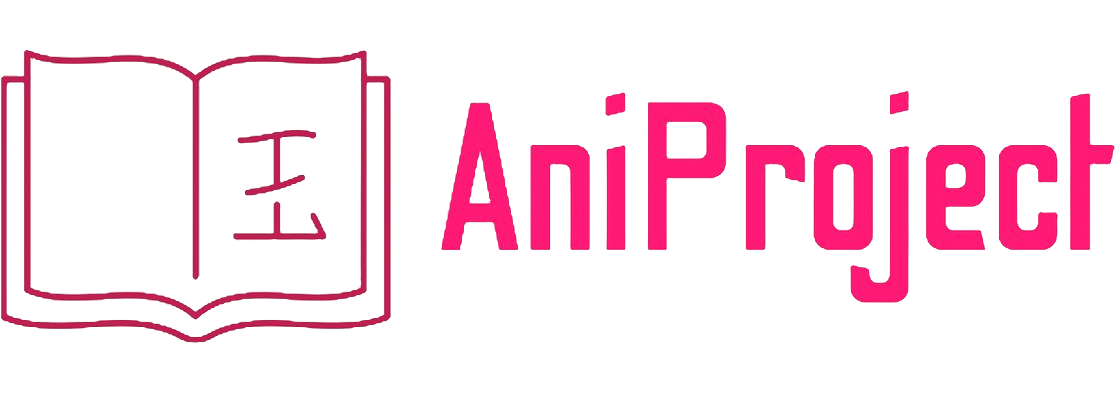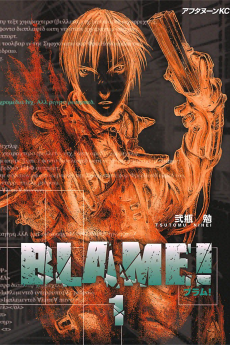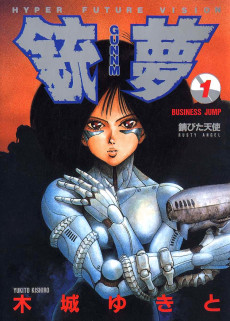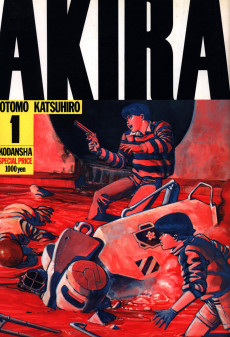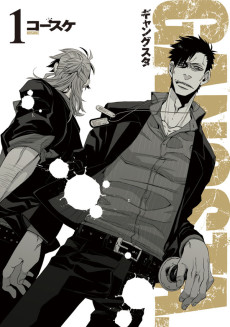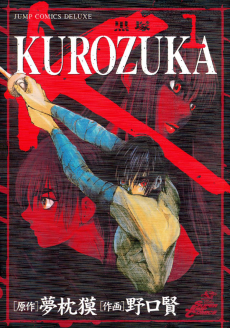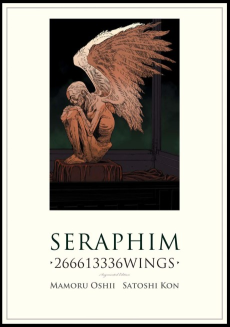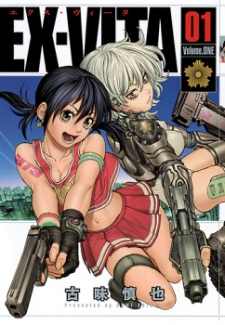EDEN: IT'S AN ENDLESS WORLD!
STATUS
COMPLETE
VOLUMES
18
RELEASE
June 25, 2008
CHAPTERS
131
DESCRIPTION
In the near future, a large portion of humanity is wiped out by a brutal, new virus that hardens the skin while dissolving internal organs. Those who aren't immune are either severely crippled or allowed to live with cybernetically enhanced bodies. Taking advantage of a world in chaos, a paramilitary force known as the Propater topples the United Nations and seeks world domination. Elijah, a young survivor searching for his mother, travels towards the Andes Mountains with an artificially intelligent combat robot. When he encounters a group of anti-Propater freedom fighters, a maelstrom of unique characters unfolds. Graphic, cyberpunk, and philosophical, Eden is a place where endearing heroes face a constant struggle for survival and violent surprises wait around every corner!
Note: The chapter count included 5 extra stories.
CAST
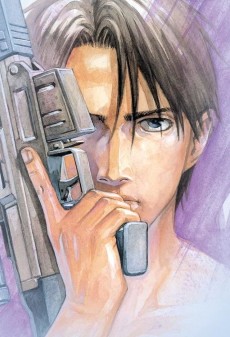
Elijah Ballard
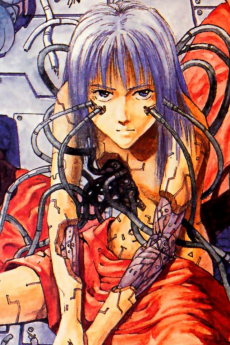
Sophia Theodores
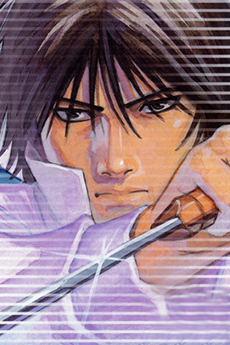
Kenji Asai

Helena Montoya
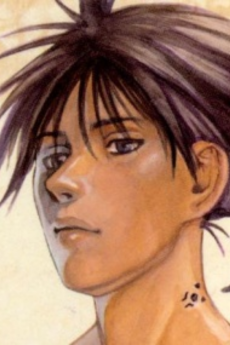
Maya

Enoa Ballard
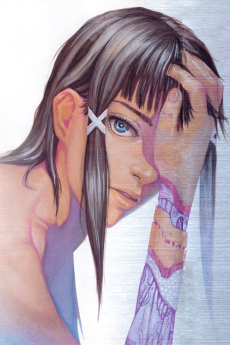
Lethia Aleetheia
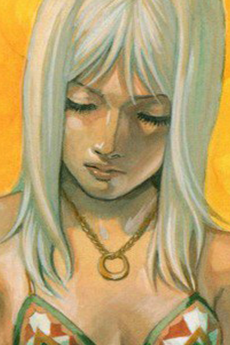
Miriam Arona
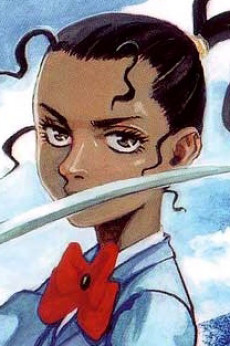
Loji

Marihan Isaku

Nazar Bajev Khan
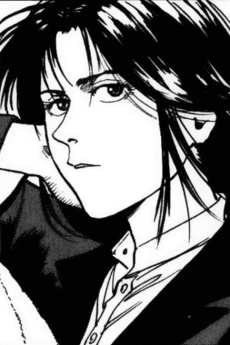
Hana Mayer

Cherubim
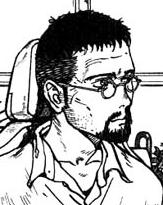
Lane Morris

Lavi Sivon

Kachua
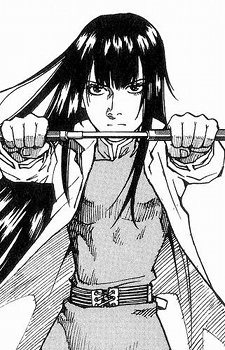
Irma Shaolan Lee
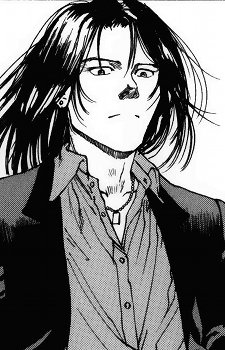
Ryuichi Asai
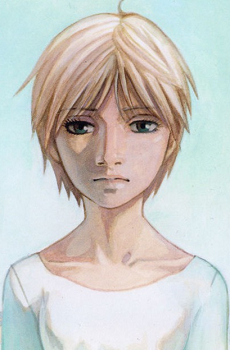
Mana Ballard

Wendy McCole
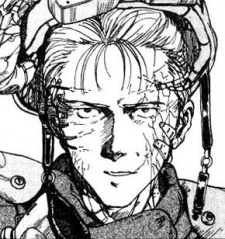
Chris Ballard

Kate Mishima
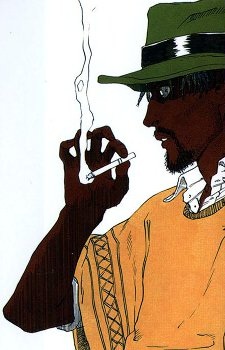
Wycliffe
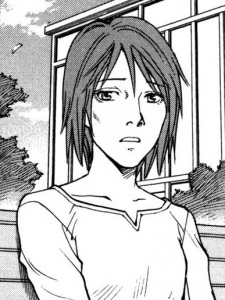
Gina Ballard

Neyzan Ibrahim
CHAPTERS
REVIEWS

DatJuno
72/100Sci-fi futuristic world is crumbling 'cause mysterious virus. Also drugs, prostitution, politics, religion and war.Continue on AniListOne thing should be clear: I wouldn't recommend Eden to everyone. While I can't deny that it has a really good setting and some pretty interesting concepts, the pace and the dozens of badly used side characters can be annoying after the 9th cool character comes out of nowhere, introduce a new concept and dies literally 1 chapter after. But let's go for the story.
In a near future, a virus that transforms people into minerals appear and starts to take over the world that is already crumbling from wars and a misteryous extremist religious organization. 2 kids that are immune to the virus are growing up in the facility Eden, isolated from the virus, and scientists starts to study them. The so called organization appears in the facility bringing havoc and is quickly wiped away by the guard robot Cherubim, controled by the boy Enoa (Did I mention that a lot of characters have religious names? Yeah, that's cool, I know). Fast forward some years and we have the main character, Elijah Ballard, a teenager son of the most powerful drug lord from South America, Enoa Ballard (!). The religious organization from before? Called Propater, they rule half of the world and have complete authority over it. I'd like to go through some of the major points of the story so you can have your own conclusions.
The good points:
- The Ballards development: This is one of the things that I find really good in the manga. For Elijah, we start with your average teenager that doesn't have a good relationship with his father and follow his path to being a determined grown up, terrorist hunted by the Propater with strong convictions. We get to understand a little more about Enoa's feelings, why he acts the way he acts and do what he do. We even see the Ballard sisters way of seeing the world, the family traumas and everything in between the love of parents and dysfunctional family bonds.
- The politics, religious discussions and the decline of our way of living: For those who like to see political conflicts between people with differente world views, the way religion can bring the best and also the worst of people and the way humanity starts to decline after a crisis, this is a full plate. In Eden, drugs and prostitution in the decaying Earth are common things. As a product of globalization and late capitalism, most part of the characters are of mixed race and it gives a touch of reality to the manga. Also, the discussions around drug abuse are quite shocking and have a real effect on history, with Elijah's older sister being a heroin addict (and later in the manga Elijah becoming one as well). Main characters doing casual sex just for relieving the tension of war or pure pleasure and Elijah's first love being a prostitute herself.
- The virus: The virus starts as something that turns people into a mineral form. After some time surviving, humanity finds vaccines and ways to contain the virus, and seeing partially disabled people because of the Closure Virus. The thing is: eventually, the virus mutates to a new form, the Disclosure Virus, which transforms people into a liquid form, then solidifies, then liquid, and then solid... turning them into strange crystals in the end of the process. What the scientists discover is that the virus' crystals, that start taking the world again (because is something entirely new, an evolution of the old virus), is actually a form of collective conscience of those affected by it. The concept is so original and mysterious that you don't know what to expect of it. If you like to read about theory of areas like biology, physics and chemistry then you'll like this as well (even though I couldn't understand most of the theoric concepts).
- Philosophy and religion: I can't extend too much on this since in the end the manga is about the merging of these things, but a lot of philosophical questions about good and evil, the value of life, human and nature intentions and the purpose of humanity's existence in the big scheme of things are addressed in Eden.
- Morality being real: It is awesome to see some gray things and the representation of different cultures not as the bad people, but just as... people. Muslim people fighting an evil christian organization that has people with good intentions, local conflicts between africans, and all in between. The manga portrays the world as it is: people acting as people.
Now, for the bad points:
- Side characters: As I said before, the author's use of side characters can be... disappointing, to say the least. The feel I get is that no one really matters aside from the Ballard family and maybe Lethia and Maya. Literally dozens of side characters are presented just to die some chapters later after introducing something new or explaining some concept. You could say that it's just a way to show how death is something trivial when you are involved with terrorists and powerful fascist organizations, but I don't think that's the case, it just looks like the author doesn't know how to handle his characters. It is frustrating that characters full of potential die like they don't have any weight on the story and totally random people just live until the end.
- Lack of explanation: Ok, some things don't really need an explanation cause it wouldn't make a difference. And it can be that I'm just dumb, but I felt kinda lost in some moments, especially regarding theoric concepts in the second half of the manga. They just kepting adding more and more concepts, each time more complicated, without properly explaining old things. A lot of concepts aren't even meant to be understood by everyone since it has some hardcore applied science, but in the end I just felt that it had some loose ends.
- The pace: To simply put it, the constancy of the pace is close to 0. Sometimes things are going so smoothly and good to read, and 1 chapter later it looks SO rushed to some chapter later it be so slow that it's boring. As it happens with the characters, it looks like the author has a problem with pace as well.
To finish it, some points unrelated to those things above:
- The setting: As a brazilian, it's really nice to see some things happening in my country, things of my culture and/or environment that I can relate (for those who don't know, Brazil is HUGE so the cultural differences between north and south, for example, are so big that it doesn't even look like the same country except for the language). Also, it's fun to see a lot of names common in Latin American. I was like: "Hey, that's my friend's name!". It can be something silly, but it's really nice.
- The art: I don't usually care if the art is said good or bad, but I guess it's valid to talk about this here. While yes, I say that the art is good in the manga (especially with the robotic things like Cherubim or the androids and cyborgs) it suffers from the same face effect. The style is realistic (maybe because it's a 90s manga) and can be really detailed sometimes with beautifully drawn faces with a normal human proportions, but everyone looks exactly the same. My guess is that it's probably because of the huge amount of characters, it should be hard to draw a totally different human being each time a new character is introduced (like every 5 chapters). Again, something the author doesn't know how to handle.

Concluding, it isn't a manga for everyone but I guess it's worth a chance, even if it's frustrating sometimes. The 21XX Earth is well constructed, consistent and realistic with destroyed landscapes and nature taking back some parts of the world. If you're a fan of sci-fi, apocalyptic settings or the type that likes big brain endings, then you MUST give this a chance.

Hopesfall
75/100a brilliant yet inadequate insight into a plausible near future and the contrast between familial love and altruism.Continue on AniListthis review contains a fair amount of spoilers. reading it ahead of the manga may very well sour your experience so it's thoroughly advised that you go over at the bare minimum three quarters of the material beforehand. you have been warned.
i have always been fascinated by the prospect of dystopias, especially those with a particular emphasis on the potential for technological advancement the further we plunge our necks into a convergence that never comes, or at least isn't prescient enough to warrant a look back at certain bygone epochs. you know, works of such sophistry and wonder that you can't help but get lost in the possibilities that may come true many years down line. hell, you may live to see them play out before your very earthly visage. the feeling of knowing the unknown will incontrovertibly morph into what's in the now and consequently known, is one that parallels few others. Eden is a manga of that such ilk, with brand-spanking highlights of the technobabble of future civilizations manifesting themselves as narrative, it harbors no shortage of idealistic navel-gazing for pompous geeks such as myself. teeming with applications of cyberization and basic tenets of the proliferation of inorganic matter and life alike, it lacks nothing in terms of what may be explored in hard sci-fi -- or perhaps that seems so.
uncapping my verbatim reflective of Endless World, one takeaway i've periodically had with respect to the ostensible “what is lacking" happens to be what isn't retroactively shown in further depth. sure, many of the theories and machinations seem plausible at a glance, but that only really scratches the surface of what can be parsed within a web of congregating vignettes, each of which encloses a facet of post-modernity as a focal point of the uncollated tale's significance in the grand scheme of things. the reason i say "a" instead of "the" is simply that there's greater thematic depth to Eden than mere photon beam emitters that penetrate even kevlar-reinforced armaments. like, is that all? what is aptly annotated superseding this markedly shoddy attempt at textual digression is the following soliloquy i had when blazing through some of the more middling chapters smack dab bookending continually fracturing episodes starring a throng of relegated cannon fodder that also somehow take comparatively major precedence to the progression of the underlying subtext of neverending despotism:
"i hope more of the inner workings of this phenomenon is explained later on but for some out-of-touch reason, i keep getting the irreverent hunch that deluding myself into believing i'll get more coverage of that as i make ordinate progress across the manga's run is conceited and asking too much of the author."
Endo, if you knew this was going to become a bump on the road in the long run then why opt to make this so heavily mired in the fauxscientific. a fine example of balls-to-the-wall cyberpunk would be Shirow Masamune's Ghost in the Shell, wherein he goes into dizzyingly succinct depth about how he envisions a japan that's not grounded in present times and tries to convey the silliness of sudden drastic changes in modern society that would entail either mass skepticism or unanimous acceptance, each depending on the sign of the times to determine which is more amiable and attuned to the world as it is at any given fixture. Hiroki Endo's Eden does not do this at all. He tries to capture the dreary aesthetic of post-economic bubble japan circa the late 90s through a bevy of variegated stances, for one there’s the political framework of a slew of governing bodies that reeked of unbounded corruption and bore a tint of manipulative mannerisms that those in charge of running the country at the time never admitted to. similarly, the globalist faction Propatria does this albeit to much broader degrees. now, its discrepancy in relation to GITS' is as follows: GITS has every reason to wax philosophical while not needing to go ham on the technobabble throughout its runtime whereas Eden plays into the conceit that it may be obliged to do the same. this is where things begin to go awry. GITS has few unchanging rules to its structural components so working with those rules all while revelling in self-indulgence is fair, but in the case of Eden you’ve got so many different tenets that often act disproportionately to one another so they clash. a lot. hence creating an induced fear of imbalance, with contradictions and inconsistencies becoming increasingly prevalent as more and more of the world therein starts to unravel.
with that being said, the other thing i can ceremoniously praise Eden for is its handling of core thematic threads and messages that weave into the narrative at large. one such theme is the importance of familial bonds and the curious ways in which they ultimately transcend innately altruistic worldviews. now i know what may be suddenly crossing your mind? what does altruism have to do with family ties, especially in as majorly complex a narrative as Endless World? well, the first of my points has to do with the Ballards, the main provocateurs of each of the stories. Comprising 5 members, each replete with distinct backstories and moments of clarity, all of them are tied by the events that transpire around them, whether they be the perpetrators or unwilling participants in them, they inevitably seem to be latched firmly in place by the world over, never once being granted control over affairs regularly galvanized by them. yes, they serve as catalysts for the dozens upon dozens of botched operations and devious schemes devised by the higher-ups of Propatria or as stated, them.
Enoa comes off at first as this idealistic child commanding this sense of anti-nihilism as he grabs whatever opportunity that dangles in front of his face by the hand. a naive opportunist, he appears readily adamant about jettisoning the paradisiacal eden that both he and his future wife Hana are stranded on. Later on, as he redebuts as a jaded revolutionary assuming responsibilities in the form of orchestrating a large scale coup’d’etat against Propatria that takes ages to reach some semblance of a conclusion, he wavers and grouchily catapults back and forth between sabotaging Propatria from within and caring for his family before settling on a definitive calling card. and thus winding up choosing his family over downing the megaestablishment douches. how very admirable. it sugarcoats the thin facade of fickle relationships and immortalizes it as something that transcends even time. who you are in the present, what forms of treachery and deceit you dare commit out in the open, how much you value everyone else more than you do your birth parents because of how much insurmountable grief they might have caused you for not having been there in your most vulnerable hours, it all doesn’t matter. family comes first and should any bad omen come their way, you must act expeditiously to endeavor and deflect whatever that imminent danger is.
kicking back the dilemma of parenthood for a bit, Eden also spares no mercy on the part of the reader as it constantly inundates them with fleeting passages of fornication. in this context specifically, prostitution. Enoa’s son, Elijah, is a disenfranchised youth. he yearns for a place to belong since losing both his younger sister and mother to a remotely spearheaded division of Propatrian lackeys imparted a toll all too hard for him to cope with. so he wanders the incan mountain range aimlessly, happening upon barren cities every so often, reminding us, the audience, that this is a war-torn future full of callous decisions and hasty science-y shenanigans condoned by glory-seeking scientists that teeter on the very brink of collapse and failure every time they experiment on a newly discovered strain of virulent microbes. that is, until he crosses paths with the mercenary group Nomad and is blackmailed into doing their bidding lest he barrels off in the opposite direction when they’re not monitoring his every misstep. fast forward some odd four years later, Elijah is now a proficient contract killer worthy of the mantle "Lecherous MacGyver”. he is serendipitously tasked with investigating a lead discovered after some of the Nomads discover a trail of blood within an Australian bioelectronics firm that indirectly stems from Propatrian soil, and so he, along with a ragtag crew of misanthropic and disgraced law enforcers plus an incubated a.i. that takes corporeal form, sets out to find what it is that they have decidedly chosen to associate themselves with. and now, for the reason as to why all of this is lost on me: the sex interspersed throughout. yes, you heard me right. there are way too many sex scenes accompanying a majority of the events i have described above, and sometimes you may even spot some instances of recreational drug use, though not for meditative purposes, mind you. the people in this manga all happen to be debaucherous animals who crave carnal pleasures and Sabbath-like epiphanies where they rather waste their lives living from one moment to the next without care for anything that does not inherently concern them. selfish, and above all, blind to the crushing realisations and expectations present only within reality. what they are and who they were before are not two inextricably linked concepts as far as they’re concerned.
i do not reserve the right to riff on about the art as gushing about manga aesthetics from a strictly technical point of view does not fall within my area of expertise, i'm afraid. although, i will comment on the general "feel" of the style Endo fosters throughout. it is predominantly consistent, and while it does dip at points, it stays very much in line of the scope of ambition and range of prose and constructs that it postulates. smooth as silk at times, and rough as sandpaper as well as soulless at others, it is truly commendable that Endo managed to work up this much of an appetite for consistency of delivery over the 10 or so years he spent writing and illustrating this wondrous piece of dystopian sci-fi.
additional notes: does anyone else feel that the exact genre that Eden is supposedly classified under should be be up in the air rather than be defined as plain cyberpunk? this does not read like how conventional cyberpunk would. rather, i infer that it jumbles up and decompartmentalizes subgenres across all basic gists native to storytelling and bastardizes and pokes fun at them individually, and one at a time. for closure, volumes 9 and 10 read like something out of a flick centered around a geopolitical turf war between unruly occupying forces and those who seek to wipe their lands clean of the aforementioned scourge, so to speak, with a backdrop incumbent on a non-specific locale, much akin to how a game of cat and mouse would unfold but only with no intentionally divulged number of sides to the unending pursuit. conversely there's nonsense like volume 14, where the better half of it is spent on a bunch of random field agents pursuing a duo of schoolgirls, one of which is a trained assassin unafraid to exercise lethal force on her foes. the thing with its tone is that it's almost school comedy-esque, with many of the shenanigans happening over the course of it being reminiscent of tacky self-aware comedies with school as the main focus a la Cromartie High School. yeah, it's kooky, i know.
SIMILAR MANGAS YOU MAY LIKE
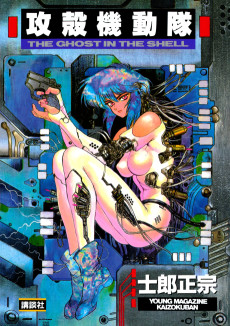 MANGA ActionKoukaku Kidoutai
MANGA ActionKoukaku Kidoutai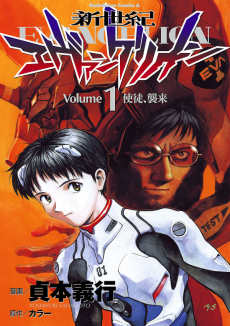 MANGA ActionShin Seiki Evangelion
MANGA ActionShin Seiki Evangelion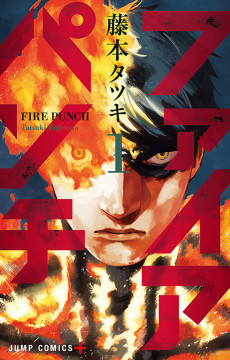 MANGA ActionFire Punch
MANGA ActionFire Punch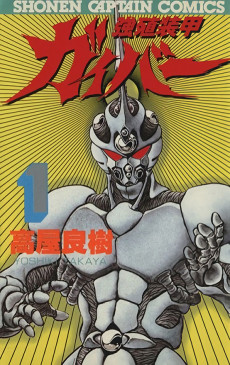 MANGA ActionKyoushoku Soukou Guyver
MANGA ActionKyoushoku Soukou Guyver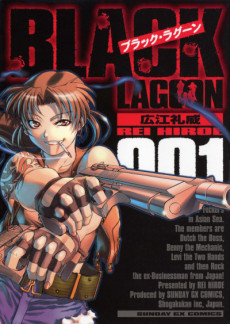 MANGA ActionBLACK LAGOON
MANGA ActionBLACK LAGOON
SCORE
- (4/5)
MORE INFO
Ended inJune 25, 2008
Favorited by 708 Users

